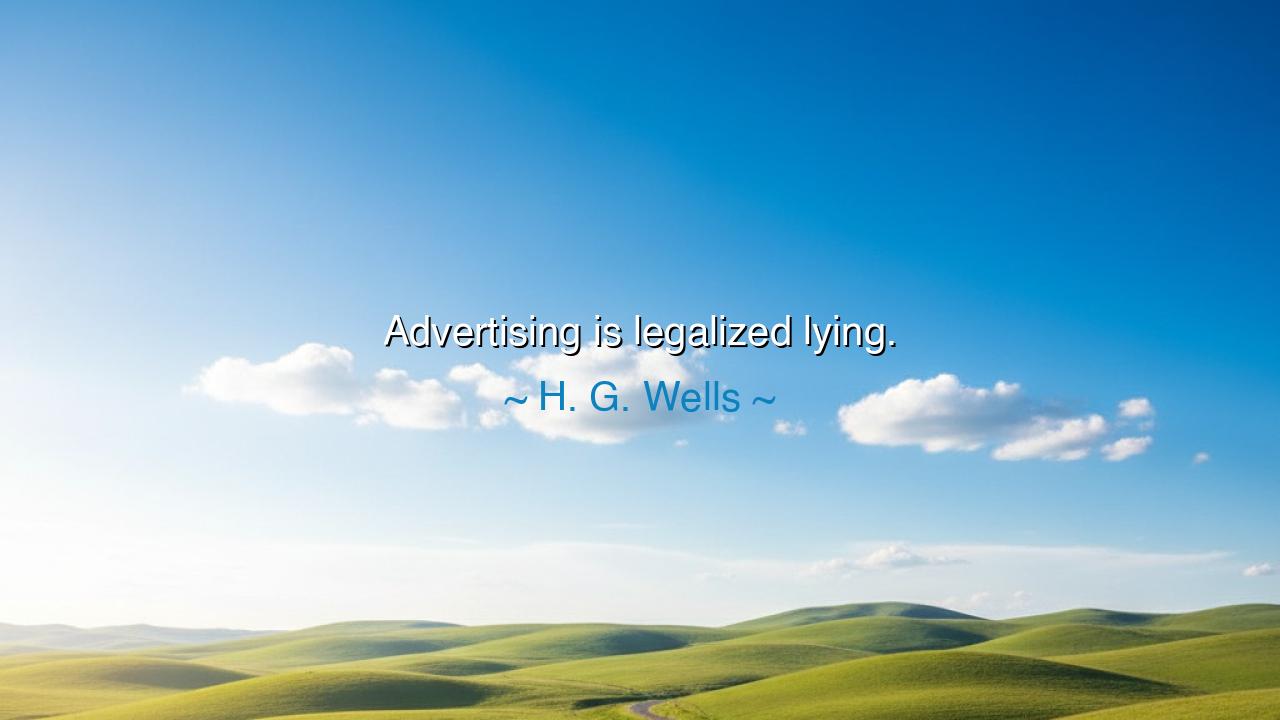
Advertising is legalized lying.






H. G. Wells, the prophet of science and seer of human folly, once declared: “Advertising is legalized lying.” These words are not the idle bitterness of a cynic, but the sharp cry of one who pierced the veil of illusion and saw the world as it is. Wells looked upon the grand machinery of commerce and beheld not pure truth, but images crafted with cunning hands—promises painted bright as the dawn, yet often hollow as the desert wind. His words ring as an ancient oracle, warning that mankind must beware the sweet honeyed tongue that flatters yet deceives.
The meaning of his saying is clear: advertising does not always spring from truth, but from persuasion, desire, and manipulation. It is the art of presenting what is partial as if it were whole, of clothing flaws with glitter, of whispering into the heart not what is, but what is desired. When Wells calls it legalized lying, he reminds us that society itself permits this distortion, sanctioning exaggeration and illusion so long as it serves the engines of trade. In this, he uncovers a paradox of modern civilization: that untruth, when gilded by commerce, may be rewarded rather than condemned.
The origin of this quote lies in Wells’s broader critique of industrial society. He lived in a time when factories poured smoke into the skies, and goods flooded markets with promises of progress. Yet he also saw how the same progress could enslave the spirit, seduce the masses, and veil reality with slogans and images. To him, advertising was not neutral—it was the siren’s song of consumerism, luring men and women into endless want. Just as the ancients told of Odysseus resisting the sirens by binding himself to the mast, so Wells counsels future generations to guard their minds against the enchantments of commerce.
History itself offers witness to Wells’s words. In the 20th century, the tale of tobacco advertising stands as a grim example. For decades, shining posters proclaimed cigarettes as symbols of freedom, vitality, and even health. Doctors in white coats were shown endorsing brands, and slogans promised calm nerves and vigor. Yet behind these glowing images lay sickness, addiction, and death. The advertising was indeed a form of legalized lying, shaping culture and behavior while concealing truth. Only years later did the world awaken to the deception, and millions had already paid the price.
There is something both evocative and heroic in Wells’s warning. For he calls upon us not merely to condemn, but to awaken. To see through the veil is itself an act of courage. Just as the warrior must learn to distinguish a true friend from a traitor, so must the citizen learn to separate truth from embellishment. To live blindly, swallowing every promise cast upon the billboards of life, is to live as a captive. But to live with discernment, to question, to doubt, to test—this is to live as a free soul.
And yet, we must also see that advertising is not only falsehood. Like fire, it can warm or destroy. It has the power to inspire noble causes, to rouse people to fight for justice, to summon help for the needy. But without vigilance, it slides into manipulation, selling not what is true but what is profitable. Thus, Wells’s words remain a challenge: to purify the voice of commerce, to demand honesty where once there was only illusion.
The lesson for us, O future generations, is this: guard your minds as sacred ground. Do not surrender your judgment to the glowing screens or painted posters. Ask always, What is hidden? What is true? What do they wish me to believe—and why? Train your sight as the eagle trains its vision, to pierce through the fog of flattery. In daily life, read labels with care, question promises, and resist the hunger that others would plant within you.
Thus, H. G. Wells speaks across time, his words both warning and torch: “Advertising is legalized lying.” Take heed, then, and let not the merchants of illusion enslave your heart. Be watchful, be discerning, and let your choices be guided not by empty promises but by truth itself. For the free soul is not the one who buys most, but the one who sees most clearly.






AAdministratorAdministrator
Welcome, honored guests. Please leave a comment, we will respond soon